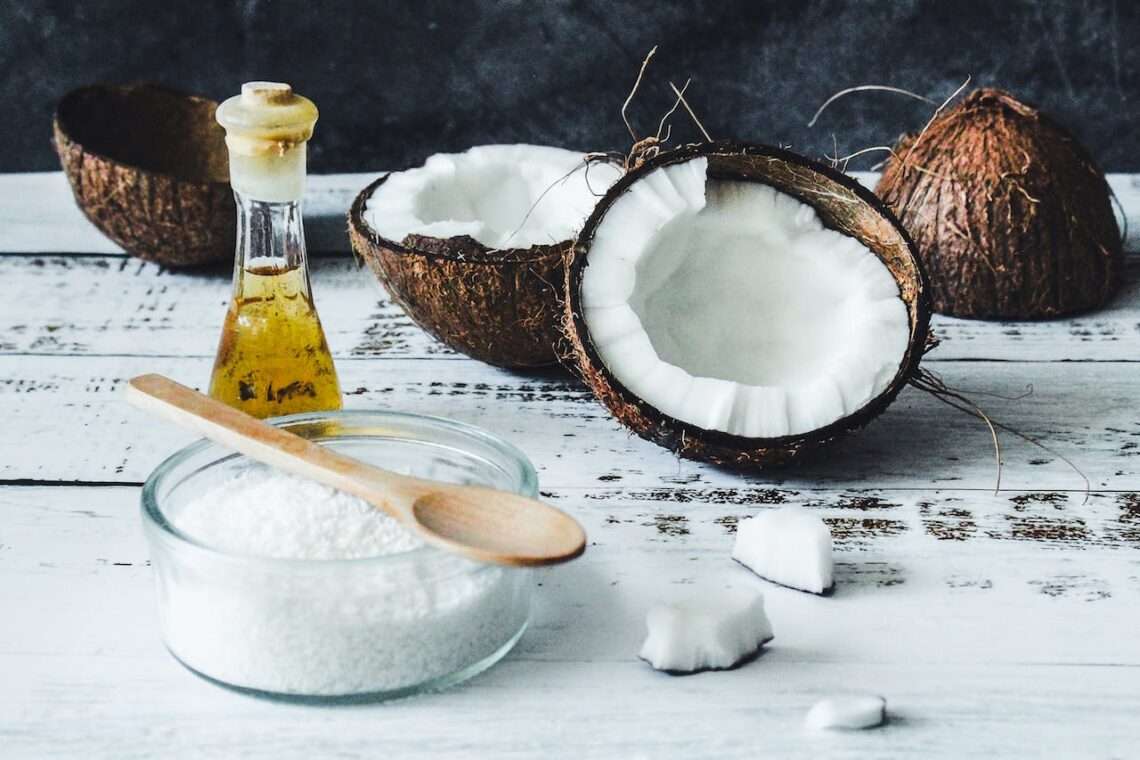
The Remarkable Benefits of Coconut Oil
Coconut oil has long been cherished for its versatility and health-promoting properties. Extracted from the flesh of coconuts, this natural elixir has found its way into kitchens, beauty routines, and holistic medicine cabinets worldwide. Its unique composition and rich nutrient profile have catapulted coconut oil into the limelight as a go-to solution for various health and beauty needs.
Its rich flavor, high smoke point, and various potential health advantages have contributed to its widespread use in culinary, cosmetic, and medicinal applications. In this blog, we’ll explore the diverse advantages of coconut oil, ranging from its nutritional content to its applications in skincare and beyond.
Historical Context and Traditional Uses
The use of coconut oil dates back centuries, with historical significance in the tropical regions where coconuts are native. In traditional cultures, coconut oil has been a staple in cooking, medicine, and religious rituals. The coconut palm, often referred to as the “tree of life,” provided communities with not only food but also materials for shelter and various other necessities.
Throughout history, coconut oil has been valued for its durability, resistance to spoilage, and versatility. In Ayurvedic medicine, an ancient Indian system of holistic healing, coconut oil has been utilized for its potential therapeutic properties. In some cultures, coconut oil has also been employed as a natural remedy for skin conditions and digestive ailments.
Popularity in Modern Times
Coconut oil’s surge in popularity is largely attributed to its unique composition, which includes a high percentage of medium-chain triglycerides (MCTs) and lauric acid. The oil’s versatility has captured the attention of health enthusiasts, chefs, and skincare enthusiasts alike, leading to its incorporation into a wide range of products and lifestyles.
Coconut oil has become a key component in various dietary trends, such as the ketogenic diet, due to its potential to boost metabolism and support weight management. Furthermore, its use in cosmetic products has expanded, with coconut oil being recognized for its moisturizing and nourishing properties for both skin and hair.
Nutritional Insights
Coconut oil has a distinctive nutritional profile that sets it apart from other cooking oils. While it is high in saturated fats, these fats are primarily in the form of medium-chain triglycerides (MCTs), which can have unique health benefits. Here’s a breakdown of coconut oil’s nutritional components:
Saturated Fats: Coconut oil is predominantly composed of saturated fats, making up about 90% of its fatty acid profile. However, unlike long-chain saturated fats found in some animal products, coconut oil’s saturated fats consist mainly of MCTs, including lauric acid, capric acid, and caprylic acid.
MCTs: Medium-chain triglycerides are known for their rapid metabolism in the body, as they are quickly absorbed and converted into energy. Lauric acid, the most abundant MCT in coconut oil, has been associated with potential antimicrobial and antiviral properties.
Calories: Like any fat, coconut oil is calorie-dense. It provides approximately 120 calories per tablespoon, similar to other oils and fats.
Healthful Properties that Contribute to Well-being:
Metabolic Boost and Weight Management: The MCTs in coconut oil are believed to increase energy expenditure and fat oxidation, potentially aiding in weight management. Some studies suggest that MCTs may have a thermogenic effect, contributing to calorie burning.
Heart Health: Despite being high in saturated fats, coconut oil has been studied for its potential impact on cardiovascular health. Some research indicates that the specific types of saturated fats in coconut oil may not have the same adverse effects on cholesterol levels as long-chain saturated fats.
Antimicrobial and Anti-inflammatory Effects: Lauric acid, a major component of coconut oil, has been shown to have antimicrobial and anti-inflammatory properties. It may help combat certain pathogens, contributing to overall immune system support.
Skin and Hair Health: When applied topically, coconut oil is valued for its moisturizing and nourishing properties. It can help maintain skin hydration, and its use in hair care is believed to enhance shine and manageability.
Brain Health: Some research suggests that the MCTs in coconut oil may have potential benefits for brain health. They are thought to provide an alternative energy source for the brain and may have neuroprotective effects.
It’s important to note that while coconut oil offers potential health benefits, moderation is key due to its calorie content. As with any dietary component, individual responses may vary, and consulting with a healthcare professional is advisable, especially for those with specific health concerns or conditions.
Skincare Benefits
Skincare routines that focus on moisturising, anti-inflammatory effects, and antioxidant properties can contribute significantly to maintaining healthy and radiant skin. Here’s a breakdown of the benefits associated with these aspects:
Moisturizing Benefits:
Deep Hydration: Coconut oil is rich in fatty acids, such as lauric acid, which deeply penetrate the skin, providing intense hydration. It helps to replenish and retain moisture, making it an effective natural moisturizer.
Barrier Function: The oil forms a protective barrier on the skin’s surface, preventing water loss and helping to maintain the skin’s natural moisture balance.
Softening and Smoothing: Regular use of coconut oil can leave the skin feeling soft and smooth. Its emollient properties contribute to a supple and well-hydrated complexion.
Anti-Inflammatory Properties:
Soothing Irritation: Coconut oil contains compounds with anti-inflammatory properties, particularly lauric acid. This can help calm irritated skin, making it beneficial for conditions like eczema, psoriasis, and dermatitis.
Reduction of Redness: The anti-inflammatory effects may also assist in reducing redness and inflammation associated with various skin concerns, promoting a more even skin tone.
Antioxidant Properties:
Free Radical Defense: The antioxidants present in coconut oil, including polyphenols and vitamin E, help combat free radicals. Free radicals can damage skin cells and contribute to premature aging, but antioxidants neutralise these harmful molecules.
Skin Repair: By protecting the skin from oxidative stress, coconut oil supports the repair of damaged cells and tissues, promoting a healthier and more youthful appearance.
Sunburn Relief:
Cooling Sensation: When applied to sunburned skin, coconut oil provides a cooling sensation, offering relief from the discomfort associated with sunburn.
Moisturizes Sun-Exposed Skin: Sunburn can lead to dry and peeling skin. Coconut oil’s moisturising effects can help prevent excessive peeling and promote healing.
Eczema and Psoriasis Support:
Alleviates Itching: Coconut oil’s anti-inflammatory and moisturizing properties can help alleviate the itching associated with eczema and psoriasis.
Supports Skin Barrier: The oil forms a protective layer that supports the skin barrier, reducing the risk of further irritation in individuals with sensitive skin conditions.
Scar Reduction:
Promoting Healing: The antimicrobial properties of coconut oil may aid in preventing infections in wounds and cuts, supporting the skin’s natural healing process.
Minimizing Scarring: Regular application of coconut oil to scars and stretch marks may help minimize their appearance over time, promoting smoother and more even-toned skin.
Gentle Makeup Remover:
Effective Cleansing: Coconut oil’s ability to dissolve and lift makeup makes it an efficient and gentle makeup remover. It can break down even waterproof products without stripping the skin of its natural oils.
Lip Care:
Soothing and Nourishing: Coconut oil is an excellent natural remedy for chapped lips. Its moisturizing and healing properties can help soothe dryness and restore softness to the lips.
As with any skincare product, individual reactions vary, so it’s recommended to perform a patch test and observe how your skin responds. Opting for organic, virgin coconut oil may maximise the benefits, as it retains more of its natural compounds.
Nourishing Haircare
Nourishing your hair and addressing common scalp issues are essential for maintaining healthy and beautiful hair. Here are some tips and suggestions for both strengthening hair and preventing damage, as well as addressing common scalp issues:
Strengthening Hair and Preventing Damage:
Deep Conditioning Treatment: Coconut oil can penetrate the hair shaft, providing deep conditioning and strengthening from within. This helps prevent breakage and split ends.
Protein Retention: The lauric acid in coconut oil has an affinity for hair proteins, helping to reduce protein loss in both damaged and undamaged hair. This can contribute to overall hair strength and resilience.
Moisturizing and Hydrating:
Sealing Moisture: Coconut oil’s molecular structure allows it to effectively seal moisture into the hair shaft, preventing dryness and promoting soft, hydrated hair.
Reducing Frizz: Regular application of coconut oil can help smooth the hair cuticle, reducing frizz and enhancing the overall manageability of the hair.
Scalp Health and Common Issues:
Dandruff Control: The antifungal and antibacterial properties of coconut oil, especially due to lauric acid, can help combat dandruff. Massaging coconut oil into the scalp may provide relief from itching and flakiness.
Promoting a Healthy Scalp: Regular use of coconut oil on the scalp can contribute to a healthier scalp environment by moisturizing and nourishing the skin. This may help prevent issues like dry scalps.
Hair Growth and Thickness:
Stimulating Hair Follicles: Coconut oil, when massaged into the scalp, may help stimulate hair follicles, promoting hair growth.
Thickening Hair Strands: The conditioning properties of coconut oil can add thickness and volume to the hair strands, contributing to a fuller appearance.
Protection from Environmental Damage:
UV Protection: Coconut oil can act as a natural sunscreen for the hair, protecting against the harmful effects of UV rays and environmental pollutants.
Preventing Heat Damage: Applying coconut oil as a pre-wash treatment or a protective serum can help minimize damage from styling tools and heat.
Detangling and Smoothness:
Natural Detangler: Coconut oil’s lubricating properties make it an excellent natural detangler. It can help ease the process of combing or brushing the hair, reducing the risk of breakage.
Enhancing Shine: Regular use of coconut oil can enhance the natural shine of the hair, leaving it looking healthy and lustrous.
To incorporate coconut oil into your hair care routine:
Pre-wash Treatment: Apply warm coconut oil to the hair and scalp, leaving it on for at least 30 minutes before washing.
Leave-in Conditioner: Apply a small amount of coconut oil to the ends of damp hair as a leave-in conditioner.
Scalp Massage: Gently massage coconut oil into the scalp to promote circulation and address common scalp issues.
It’s important to note that while coconut oil works well for many people, individual responses may vary. Performing a patch test and adjusting the amount based on your hair type and needs is recommended. Use high-quality, organic, and unrefined coconut oil for the best results.
Culinary Uses
Coconut oil is a versatile and flavorful cooking oil that can be used in various culinary applications. Here are some ways to incorporate coconut oil into your cooking along with health-conscious tips and recipes:
Sautéing and Stir-Frying: Coconut oil has a high smoke point, making it suitable for sautéing and stir-frying. Its unique flavor adds a delightful tropical twist to a variety of dishes, from vegetables to proteins.
Health Tip: Use virgin or unrefined coconut oil for a more pronounced coconut flavor and to retain maximum nutritional benefits.
Baking and Cooking: Coconut oil can be used as a substitute for butter or other cooking oils in baking. It adds a subtle coconut flavor to cookies, cakes, and muffins.
Health Tip: When substituting coconut oil for butter, use a 1:1 ratio but slightly reduce the total amount, as coconut oil is pure fat.
Smoothies and Beverages: Incorporate coconut oil into your smoothies for a creamy texture and a boost of healthy fats. It pairs well with tropical fruit combinations.
Health Tip: Start with a small amount and gradually increase to your taste preference. This can add richness without overwhelming the flavor.
Popcorn Topping: Instead of traditional butter, drizzle melted coconut oil over popcorn for a unique and tasty treat.
Health Tip: Mix in nutritional yeast, a pinch of sea salt, or your favorite spices for added flavor without sacrificing health.
Dressings and Marinades: Combine coconut oil with herbs, citrus, and spices to create delicious salad dressings.
Health Tip: Opt for a lighter coconut oil or mix it with other oils like olive oil for a well-balanced dressing.
Grilling and Barbecuing: Create marinades with coconut oil, herbs, and spices for grilling meats or vegetables.
Health Tip: The natural sweetness of coconut oil pairs well with savory marinades, adding a unique flavor to grilled dishes.
Bulletproof Coffee: Blend coconut oil into your morning coffee for a creamy, frothy texture. This popular trend, known as Bulletproof coffee, can provide sustained energy.
Health Tip: Start with a small amount of coconut oil and gradually increase. You can also add a splash of coconut milk for extra richness.
Health-conscious Cooking Tips: Opt for virgin or unrefined coconut oil to ensure maximum retention of its natural flavor and health benefits.
Moderation is Key: While coconut oil offers health benefits, it’s calorie-dense. Use it in moderation as part of a balanced diet.
Combine with Other Oils: Mix coconut oil with other oils like olive oil for a well-rounded flavor profile and a balance of different types of fats.
Recipes:
Coconut Oil Granola: Mix rolled oats, nuts, seeds, and dried fruits with melted coconut oil, honey, and a pinch of salt. Bake until golden for a crunchy and wholesome granola.
Coconut Curry Chicken: Sauté chicken in coconut oil with curry spices, garlic, and ginger. The curry will be richer and more flavorful if you add coconut milk.
Coconut Blueberry Muffins: Use coconut oil in place of butter in your favorite blueberry muffin recipe for a tropical twist.
Coconut-Lime Energy Bites: Combine shredded coconut, coconut oil, lime zest, and nuts. Form into bite-sized balls for a nutritious and energizing snack.
Experimenting with coconut oil in the kitchen can add a delicious and health-conscious element to your cooking repertoire.
Weight Wellness
Coconut oil has been a topic of interest in the context of weight wellness due to its unique composition of fatty acids and potential effects on metabolism. While it’s not a magic solution, incorporating coconut oil into a balanced diet may have some benefits for weight management. Here’s a closer look at coconut oil’s role in metabolism and how to integrate it into your diet:
Coconut Oil and Metabolism:
Medium-Chain Triglycerides (MCTs): Coconut oil is rich in medium-chain triglycerides (MCTs), which are fatty acids that are metabolized differently than long-chain fatty acids found in many other oils. MCTs are quickly absorbed and can be used as a rapid source of energy.
Increased Energy Expenditure: Some studies suggest that the consumption of MCTs may lead to an increase in energy expenditure compared to other fats. This could potentially contribute to weight loss or weight maintenance.
Appetite Regulation: MCTs may have an impact on appetite regulation, helping people feel more satiated and potentially reducing overall calorie intake.
Thermogenic Effect: MCTs have a thermogenic effect, meaning they may increase the body’s calorie-burning process, leading to a temporary boost in metabolism.
Integration into a Balanced Diet:
Moderation is Key: While coconut oil may have potential benefits, it’s important to use it in moderation. It is calorie-dense, and excessive consumption can lead to an increase in overall calorie intake.
Replace Unhealthy Fats: Consider substituting less healthy fats in your diet with coconut oil. For example, use it as an alternative to butter or other cooking oils.
Cooking and Baking: Coconut oil has a high smoke point, making it suitable for cooking at higher temperatures. Use it for sautéing, stir-frying, or baking.
Smoothies and Beverages: Add a teaspoon of coconut oil to your morning smoothie or coffee for a flavorful boost.
Incorporate into Recipes: Use coconut oil in recipes for dishes like curries, granola, energy bars, or homemade salad dressings.
Whole Food Sources: Consider including whole coconut-based foods in your diet, such as coconut milk, shredded coconut, or fresh coconut meat.
Pair with a Balanced Diet: Coconut oil is just one component of a healthy diet. Ensure your overall eating pattern includes a variety of nutrient-dense foods, such as fruits, vegetables, whole grains, lean proteins, and healthy fats.
Stay Mindful of Total Caloric Intake: While coconut oil may have potential benefits, it’s crucial to be mindful of your total caloric intake. Balancing calories in and calories out is key to weight management.
Remember that individual responses to dietary changes can vary, and it’s always a good idea to consult with a healthcare professional or a registered dietitian before making significant alterations to your diet, especially if you have any underlying health conditions.
Potential Health Effects
Coconut oil has been associated with certain potential health benefits, including antimicrobial and immune-boosting properties. While some studies suggest positive effects, it’s important to note that research is ongoing, and individual responses may vary. Here are some insights into these potential health boosts:
Antimicrobial Properties:
Lauric Acid Content: Coconut oil contains a significant amount of lauric acid, a medium-chain fatty acid known for its antimicrobial properties. Lauric acid has been shown to have antibacterial, antiviral, and antifungal effects.
Antibacterial Effects: A study published in the “Journal of Medicinal Food” in 2013 found that virgin coconut oil exhibited antibacterial activity against various strains of bacteria, including Staphylococcus aureus.
Antifungal Properties: Research published in the “Journal of Medicinal Food” in 2014 demonstrated the antifungal activity of coconut oil against Candida species.
Antiviral Effects: Lauric acid in coconut oil has shown potential antiviral effects. A study published in the “Journal of Lipid Research” in 2001 found that lauric acid had antiviral activity against enveloped viruses.
Immune-Boosting Properties:
Antioxidant Activity: Coconut oil contains antioxidants that may help combat oxidative stress in the body. Antioxidants play a role in supporting the immune system by neutralizing free radicals.
Anti-Inflammatory Effects: Some components of coconut oil, including phenolic compounds, may have anti-inflammatory effects. Chronic inflammation can negatively impact the immune system, and reducing inflammation may support overall immune function.
Immune Modulation: A 2017 review published in “Nutrition Reviews” suggested that coconut oil and its components may have immune-modulating effects, influencing the body’s immune response.
Studies Supporting Health Claims:
“Antimicrobial effects of virgin coconut oil and its medium-chain fatty acids on Clostridium difficile” (2018): This study explored the antimicrobial effects of virgin coconut oil and its medium-chain fatty acids against Clostridium difficile, a bacterium associated with gastrointestinal infections.
“Effects of dietary coconut oil on the biochemical and anthropometric profiles of women presenting abdominal obesity” (2015): This study investigated the impact of dietary coconut oil on various health markers, including lipid profiles and body composition, in women with abdominal obesity.
“Coconut oil protects cortical neurons from amyloid beta toxicity by enhancing signaling of cell survival pathways” (2014): The study focused on the neuroprotective potential of coconut oil against amyloid beta toxicity, suggesting a role in supporting brain health.
Research on coconut oil’s health effects is ongoing, and more studies are needed to confirm and understand the mechanisms underlying these potential benefits. As with any dietary considerations or health-related changes, it’s advisable to consult with a healthcare professional, especially for individuals with specific health conditions or concerns.
Choosing the Right Coconut Oil
Choosing the right coconut oil involves understanding the available types and considering factors determining its quality. Here are some key points to help you make an informed decision:
Types of Coconut Oil:
Refined Coconut Oil: Extracted from dried coconut meat, refined coconut oil is often processed to remove impurities and odors. It has a higher smoke point, making it suitable for cooking at higher temperatures. However, the refining process may result in a loss of some nutrients.
Unrefined (Virgin) Coconut Oil: Unrefined coconut oil is extracted from fresh coconut meat without undergoing chemical refining. It retains a coconut flavor and aroma and may have a lower smoke point. It is best used in low to medium-heat cooking or as a flavor enhancer in recipes.
Cold-Pressed Coconut Oil: Cold-pressed coconut oil is extracted without heat, preserving more of the natural flavor, aroma, and nutritional benefits. This method is often associated with high-quality virgin coconut oil.
Fractionated Coconut Oil: Fractionated coconut oil is processed to isolate specific medium-chain triglycerides (MCTs). It remains in liquid form even at low temperatures and is often used in skincare products.
Organic Coconut Oil: Organic coconut oil is produced without synthetic pesticides or fertilizers, ensuring a more natural and environmentally friendly product.
Considerations for Quality:
Source and Processing: Choose coconut oil that is sourced from reputable suppliers and produced through methods that retain the oil’s natural qualities. Look for labels like “cold-pressed” or “unrefined.”
Color and Aroma: High-quality virgin coconut oil should have a pleasant coconut aroma and a natural, slightly off-white color. Refined coconut oil is often colorless and odorless.
Packaging: Quality coconut oil is typically packaged in dark, glass containers to protect it from light and prevent oxidation. Avoid plastic containers, as they may leach chemicals into the oil.
Certifications: Look for certifications such as “organic,” which indicates that the coconut oil is produced without synthetic chemicals. Third-party certifications can also attest to the quality of the product.
Storage Conditions: Coconut oil is sensitive to heat and light, so store it in a cool, dark place to prevent rancidity and preserve its freshness.
Transparency of Information: Reputable brands provide clear information about the sourcing, processing methods, and any certifications. Check for this information on the product label or the manufacturer’s website.
Price vs. Quality: While price can be an indicator of quality, it’s not the sole factor. Some high-quality coconut oils are competitively priced, so consider other factors such as source, processing methods, and certifications.
User Reviews: Read reviews from other consumers to get insights into their experiences with a particular brand or type of coconut oil.
Remember that personal preferences, dietary needs, and culinary uses may influence your choice of coconut oil. Experimenting with different types can help you find the one that best suits your taste and requirements.
Addressing misconceptions about coconut oil
Coconut oil has gained popularity for its potential health benefits, but it’s also surrounded by various myths and misconceptions. Let’s address some of these myths and clarify fact from fiction:Myths about coconut oil clarified
Myth 1: Coconut Oil is a “Miracle” Weight Loss Solution
Reality: While some studies suggest that the medium-chain triglycerides (MCTs) in coconut oil might increase energy expenditure and contribute to weight loss, it’s not a magic solution. Weight loss is complex and requires a holistic approach, including a balanced diet and regular exercise.
Myth 2: Coconut Oil is the Healthiest Cooking Oil
Reality: Coconut oil has a high saturated fat content, primarily lauric acid. While it may have health benefits, it’s essential to use it in moderation. It’s not the only healthy option; other oils like olive oil and avocado oil, which contain unsaturated fats, also have their own nutritional advantages.
Myth 3: Coconut Oil is a Cure for Alzheimer’s Disease
Reality: There is some research suggesting that the ketones produced from MCTs might provide an alternative energy source for the brain, potentially benefiting individuals with Alzheimer’s. However, this is still an area of ongoing research, and coconut oil should not be considered a cure for Alzheimer’s.
Myth 4: Coconut Oil Raises Cholesterol and Heart Disease Risk
Reality: The effect of coconut oil on cholesterol levels is a topic of debate. While it may increase both good (HDL) and bad (LDL) cholesterol, its impact on the overall risk of heart disease remains unclear. Moderation and considering individual health conditions are crucial.
Myth 5: Coconut Oil is Suitable for All Skin Types
Reality: While many people find coconut oil beneficial for their skin, it may not be suitable for everyone. Some individuals may be allergic to coconut oil, and its comedogenic properties could lead to clogged pores for some skin types. Patch testing is recommended.
Conclusion
Coconut oil stands out as a multifaceted, natural solution with a plethora of benefits for both internal and external well-being. Whether consumed for its nutritional content or applied topically for skincare, the advantages of coconut oil extend far beyond its delightful taste and aroma. Including coconut oil as part of a diverse and well-rounded diet is a sensible approach.
As with any supplement or skincare product, it’s advisable to consult with healthcare professionals, especially for individuals with specific health concerns or conditions. By staying well-informed and making conscious decisions, we can maximize the benefits of coconut oil while navigating the sea of misinformation that surrounds it. Embrace the holistic benefits of coconut oil and enjoy your journey towards a healthier, happier lifestyle.


You May Also Like

Morning Skincare Routine in 5 Easy Steps
17 March 2024
5 Easy Hairstyles for Busy Mornings
6 January 2025

